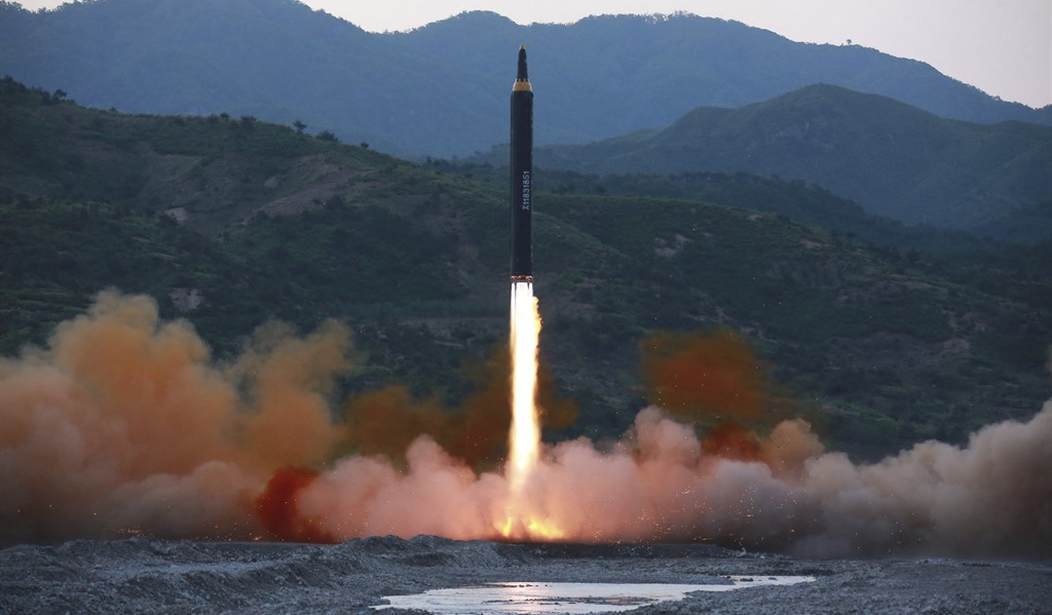“It’s hitting a bullet with a bullet,” Vice Admiral James Syrian told Fox News, but the missile defense system has succeeded at it. According to a Pentagon statement earlier, a ground-based missile interceptor destroyed a test intercontinental ballistic missile on a track to target the US. The successful missile shield test is the first in almost three years, and sends a clear message to at least one nation rushing to build its own ICBM platform:
The U.S. military successfully shot down a mock nuclear warhead simulating the speed and range of a potential North Korean intercontinental ballistic missile, the Pentagon’s Missile Defense Agency said Tuesday.
In a statement, the agency said an unarmed rocket launched from the Marshall Islands in the Pacific Ocean was “destroyed” by a ground-based interceptor launched from Vandenberg Air Force Base in Southern California as it traveled outside Earth’s atmosphere.
The successful test was the first of its kind in nearly three years.
It came two days after North Korea tested a SCUD-type ballistic missile that landed in Japan’s maritime economic zone in the Sea of Japan.“This system is vitally important to the defense of our homeland, and this test demonstrates that we have a capable, credible deterrent against a very real threat,” said MDA Director Vice Admiral Jim Syring. “I am incredibly proud of the warfighters who executed this test and who operate this system every day.”
The Pentagon downplayed any specificity about the intended purpose of this test, in terms of adversaries. Rather, the spokesman told the press, the US just wants to make sure everyone understands that we are prepared for any threat:
The test is the first of the ground-based, mid-course defense system against an ICBM-class target, Pentagon spokesman Capt. Jeff Davis told reporters at the Pentagon ahead of the test. …
“Obviously, North Korea is one of the reasons why we have this capability,” Davis said. “But North Korea is not the only reason why we have this capability and why we test this capability. Iran also continues to develop more sophisticated missiles and improve the range and accuracy of current missile systems.”
The interceptor tested Tuesday is just one element of a broader strategy to protect the country from incoming missiles.
“We improve and learn from each test, regardless of the outcome. That’s the reason we conduct them,” Davis said. “Our goal is to continue to be able to tell you with confidence that we have the ability to defend the homeland.”
It’s not Miller Time just yet, warned Rep. Adam Smith. The ranking Democrat on the House Armed Services Committee noted that the US needs more testing to ensure reliability, and seemed to take a swipe at the Pentagon for the lack of practice:
Washington Rep. Adam Smith, the top Democrat on the House Armed Services Committee, congratulated the Missile Defense Agency for a successful test but sounded a note of caution that “much work remains to be done to ensure we have a reliable and effective system.”
“After an investment of more than $40 billion since 2002, it’s good that the Missile Defense Agency is finally doing a missile defense test against an ICBM target, some 13 years after the first Ground-Based Interceptor system’s deployment,” Smith told CNN.
“Flight intercept testing, particularly against realistic targets, remains a key element of the program to assess the effectiveness of our deployed missile defense system, as well as to demonstrate the capability and continue the development of such a system,” he added.
Well, whose fault was the delay? Over the previous eight years, Barack Obama was commander in chief, and he didn’t exactly put a premium on missile defense. For that matter, Democrats have consistently either opposed it altogether or limited funds for development of ICBM interceptor systems, preferring to emphasize strategic limitation treaties instead. Obama canceled a ground-based missile-defense system in eastern Europe to appease Russia in his first year in office, a system that certainly could have helped push the technology forward as well as ensured a tougher stand vis-a-vis Moscow and NATO.
Smith’s correct, of course, that we need more practice. Before we get that, though, we needed an administration who took missile defense more seriously. Perhaps we’ll make our capabilities even more plain over the next few months, and convince Pyongyang that they’re barking up the wrong tree.







Join the conversation as a VIP Member